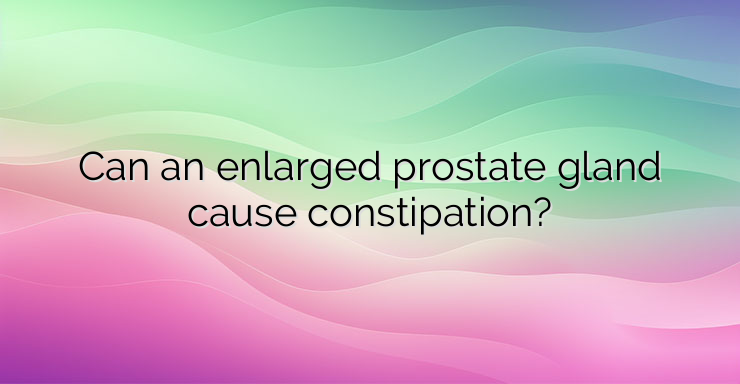What can an enlarged prostate cause? In rare cases, an enlarged prostate can press on nearby structures, blocking the intestines and causing constipation. The presence of constipation, in turn, can also worsen the symptoms of prostatic hypertrophy, which can lead to frequent and urgent urination. The prostate gland is part of the male reproductive system and is a solid body about the shape and size of a chestnut that surrounds the urethra at the neck of the bladder. The urethra is the channel through which urine from the bladder reaches the penis and is expelled from the body. The prostate enlarges with age and can cause benign hyperplasia, or mild enlargement that is not associated with cancer. Benign prostatic hyperplasia (BPH) is the most common prostate problem in men over the age of 50. An enlarged prostate can potentially cause symptoms affecting the urinary system, but constipation is a much less common complication. How can an enlarged prostate cause constipation? Constipation is rarely associated with an enlarged prostate. Benign prostatic hyperplasia is more likely to cause difficulty starting urination, stop-start urine flow, urge to urinate, and urinary incontinence (involuntary leakage of urine). However, because the prostate, bladder, and rectum (rectum) are organs located close together, a problem with one can cause secondary problems with another. For example, constipation may be due to a swollen bladder. A 2018 study described the rare case of a 67-year-old man with abdominal pain, urinary retention, and constipation. Doctors have discovered that the main cause of these symptoms is an enlarged prostate gland. The US National Institute of Diabetes and Digestive and Kidney Diseases (NIDDK) explains that as the prostate grows, it can press on the urethra. The walls of the bladder thicken and the bladder cannot empty completely. A distended bladder can put pressure on the colon and cause a bowel obstruction, leading to constipation. Can prostate cancer cause constipation? In rare cases, metastatic prostate cancer can cause constipation and other symptoms, such as lower back pain. A 2022 article described a case of an 82-year-old man with an enlarged prostate who had chronic constipation. He also reported experiencing stomach pain, lower back pain, and numbness. Diagnostic tests revealed that the prostate cancer had spread to the patient’s spine. Can constipation harm the prostate? Constipation does not directly harm the prostate, but it can worsen the symptoms of benign prostatic hyperplasia. If the rectum is full, it can put pressure on the bladder, causing an urge to urinate, frequent urination, or incontinence. Can prostate medications cause constipation? Specialists prescribe drugs,which shrink or slow the growth of the prostate or reduce the symptoms of benign prostatic hyperplasia. A 2018 article on BPH medications mentions that constipation is not a typical side effect of these medications. The most common side effects of these drugs include sexual dysfunction, such as erectile dysfunction and decreased libido. Treating constipation involves changing your diet to make stools softer and easier to pass through the intestines. Some tips for constipation include: Eating more high-fiber foods, such as beans and legumes, vegetables, and fruits; Intake of larger amounts of water, especially with the intake of a dietary supplement with fiber; Increased physical activity, as regular exercise helps move the bowels. If dietary changes and exercise are ineffective, a specialist may recommend using an over-the-counter laxative to encourage bowel movements. Types of OTC laxatives include: Dietary fiber supplements; Osmotic cleaning agents; Stool softeners; Lubricants, such as mineral oil; Stimulants. If over-the-counter treatments for constipation are ineffective, your doctor may recommend the following treatments: Prescription medications; Biofeedback therapy to retrain the muscles that control bowel movements; Surgery to correct a large bowel obstruction. References: 1. National Health Service (NHS). Benign prostate enlargement 2. National Center for Biotechnology Information (NCBI). Fujisaki, T., et al. (2019). Large bowel obstruction caused by urinary retention from benign prostate hyperplasia 3. National Institute of Diabetes and Digestive and Kidney Diseases (NIDDK). Prostate enlargement (benign prostatic hyperplasia) 4. Medical News Today. Can an enlarged prostate cause constipation?the doctor may recommend the following treatments: Prescription drugs; Biofeedback therapy to retrain the muscles that control bowel movements; Surgery to correct a large bowel obstruction. References: 1. National Health Service (NHS). Benign prostate enlargement 2. National Center for Biotechnology Information (NCBI). Fujisaki, T., et al. (2019). Large bowel obstruction caused by urinary retention from benign prostate hyperplasia 3. National Institute of Diabetes and Digestive and Kidney Diseases (NIDDK). Prostate enlargement (benign prostatic hyperplasia) 4. Medical News Today. Can an enlarged prostate cause constipation?the doctor may recommend the following treatments: Prescription drugs; Biofeedback therapy to retrain the muscles that control bowel movements; Surgery to correct a large bowel obstruction. References: 1. National Health Service (NHS). Benign prostate enlargement 2. National Center for Biotechnology Information (NCBI). Fujisaki, T., et al. (2019). Large bowel obstruction caused by urinary retention from benign prostate hyperplasia 3. National Institute of Diabetes and Digestive and Kidney Diseases (NIDDK). Prostate enlargement (benign prostatic hyperplasia) 4. Medical News Today. Can an enlarged prostate cause constipation?


Leave a Reply